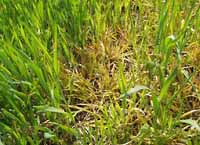Rye and meadow bromes now threaten wheat yields

Rye and meadow bromes could pose as big a threat to wheat yields as blackgrass in some areas of Essex, according to Harlow Agricultural Merchants’ Richard Peake.
Heavy rain during harvest 2010 and in late September and early October meant drilling was delayed. During this period, blackgrass germinated well and glyphosate pre-drilling was an effective first control measure.
“Full doses of Crystal (flufenacet + pendimethalin) and diflufenican pre-emergence performed extremely well,” said Mr Peake. “Autumn weather conditions also suited the post-emergence sprays, so this spring we are enjoying the best levels of blackgrass control that we have seen for years in Essex.”
However, in its place comes the challenge of rye and meadow bromes. Pre-emergence treatments do not control these weeds and Mr Peake believes that left uncontrolled, they can soon build up to levels that pose as big a threat to yields as blackgrass.
The spread of the bromes across the county may be due to the large proportion farm-saved seed, coupled with the difficulty of cleaning weeds from seed samples, even with professional mobile cleaning services.
“Farmers really need to get on top of these damaging grasses, especially where C1 seed is being grown for next year’s seed,” said Mr Peake. “Too often when farmers are choosing fields to grow seed for their own use, they just do not see these weeds.”
He is recommending the use of Broadway Star (pyroxsulam + florasulam) for the effective control of both bromes.
“In addition, it will clean up other grass weeds, such as ryegrass and wild oats,” he added.
